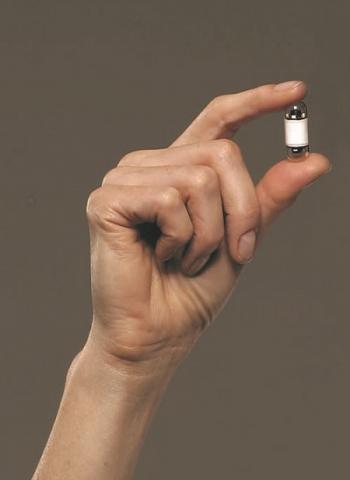
Innovative technology and new developments have been introduced in NHS Tayside over the last year as part of the organisation’s response to COVID-19.
The challenges of the pandemic across health and social care services in Tayside have resulted in a year of invention, innovation and news ways of working.
Out of the uncertainty and restrictions placed on the delivery of healthcare services, there have been many new developments introduced across Tayside. Here’s a rundown of some of them:
Colon Capsule
Clinicians in NHS Tayside are using a new technology in the form of a tiny camera inside a pill, called a colon capsule, to help early detection of bowel cancer and reduce waiting times.
The additional cleaning and PPE requirements in hospitals mean that fewer colonoscopy procedures can be carried out each day than before COVID.
A pilot project will see 200 patients use the capsule as an alternative to colonoscopy. Since it was introduced in December, 2020, 50 patients have so far had the procedure.
The colon capsule films the inside of the lower intestine to determine whether there are any abnormalities. It is non-invasive, painless and the patient does not need to be sedated. Patients attend a community hub to swallow it then return home, with the capsule ultimately being passed into the toilet and flushed away.
Many patients will need no further tests and will not need to attend hospital, meaning that waiting times can be reduced for those who do require hospital procedures.
Cytosponge
Another new pill technology will be introduced in NHS Tayside as an alternative to an endoscopy procedure. Cytosponge is a small sponge on a string wrapped in a coated pill which can easily be swallowed with a glass of water. It can be completed in minutes without the need for an anaesthetic. The sponge takes samples of the lining of the gullet and can look for early signs of cancer.
Cytosponge can be performed outside of traditional hospital environments, such as in community health centres or general outpatient clinics, as it does not release droplets of body fluids into the environment.
This will help reduce demand for standard endoscopy procedures and mean more patients can be seen sooner. Key staff have undergone training and it is hoped that the Cytosponge will be in use in April.
Mobile solutions delivering treatment
A number of mobile diagnostic units have been deployed across Tayside to provide extra capacity for scans and procedures.
COVID-19 had a big impact on endoscopy services last year and the additional infection control measures needed meant that the department was working at just under 40% of its normal capacity. To help address this, a mobile endoscopy unit was set up at Ninewells in November which can see up to 110 patients per week.
A mobile MRI scanner has been at Perth Royal Infirmary and Ninewells Hospital at points over the past year, along with a mobile CT scanner at Perth Royal Infirmary, to make sure more patients could be seen. These units have meant that more than 5,000 patients have been able to have their scan despite the many restrictions on the services.
Near Me
NHS Tayside moved to providing more services remotely during the COVID-19 pandemic by making greater use of phone and video consultations.
The Near Me service allows patients to use their own digital device to join a video call for their booked appointment where clinicians can speak to their patients remotely.
Since March 2020, over 262,000 clinical appointments have taken place over the phone or online.
The majority of these have been GP and outpatient appointments with 119 services and departments across NHS Tayside using the service to see patients who do not need to attend a healthcare site.
A patient survey undertaken last year showed that almost 98% of those who have used Near Me said they would use it again, with patients noting it has helped reduce their travel time and has increased their accessibility to healthcare.